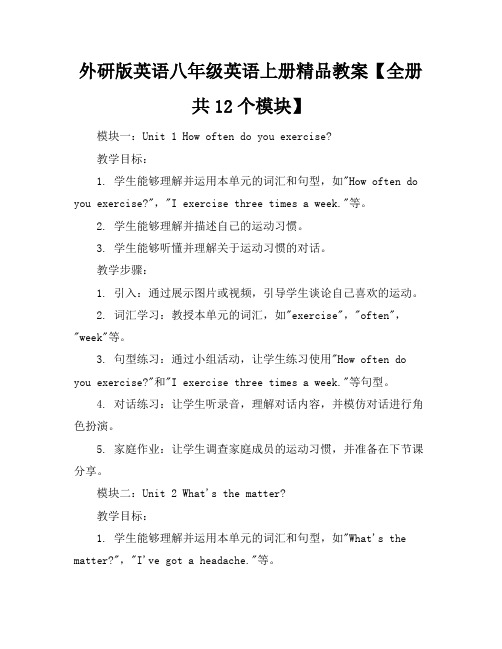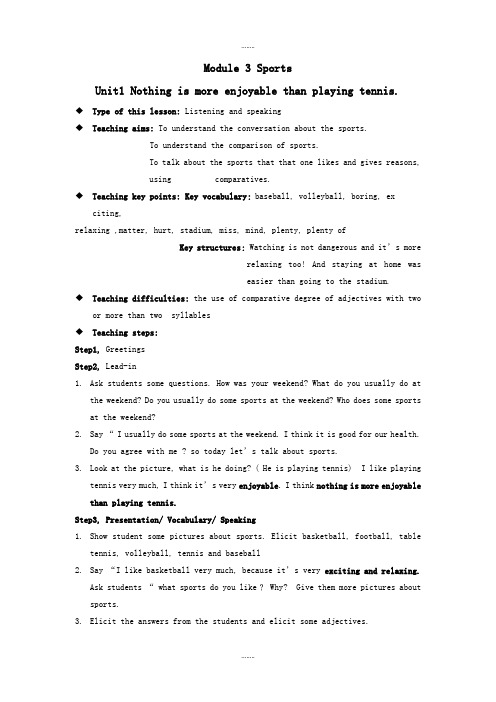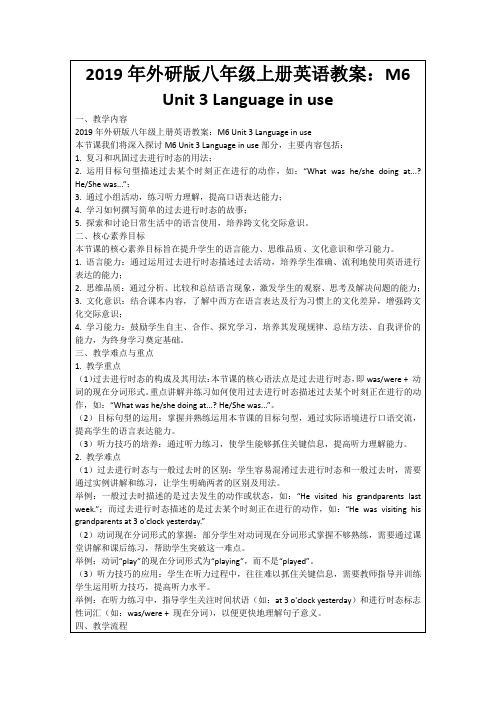2019年外研版初中英语八年级上册优质课教案
外研版初中英语八年级上册全册教学设计教案

外研版初中英语八年级上册全册教学设计教案外研版初中英语八上全册教案及导学案初二英语(上)Module 1 Unit 1 教学设计教材分析:Unit 1通过听、读、说训练,初步学习给别人提建议的方法。
其中活动1要求将所给表示学习活动的词汇分类;活动2要求根据录音判断对话主题;活动3—5听读包含建议的对话并完成填表、答问等任务。
活动6学习英语中的连读法;活动7根据提示口头练习给别人提建议的方法。
教学目标:To get to know the key vocabulary.To understand the dialogue 3.To be able to talk about the problems in learning English.教学重点:Key points: translate, correct, grammar, pronunciation, spelling, try to do,Why don‘t you…? How about…?教学方法Listening and speaking.教具准备Tape recorder教学流程Grade8 Module1 Unit2达标题:一.Complete the sentences with the next words.Check correct improve match number1.______your English by listening to the radio.2.______the pictures in the order you hear them.3.______the mistakes in these sentences.4._______the pictures with the paragraphs.5._______ your spelling and punctuation.二.完成单词1.You should practice more to i ___________ your English.2.Can you c_________ to 100 in English.3.Don‘t f_________ to turn off the English when you leave the room .4.I can‘t r__________ all the new words .5.Can you t__________ this word .I don‘t understand it.6.R__________ the correct answer.Unit 3 Language in use 教学设计贾建芝教学目标T o encourage students to write an English study plan for themselves this year.To say what they‘re good at, what they aren‘t good at and what they should do.教学重点Focus: Why don‘t we …?How about…?You should do ….It is + adj. + to do ….设计思路Present a practical task for the students to learn language in use.Teaching stepsWarming-up教师活动 1.Ask the Ss to retell the text in Unit 2. Choose one question to retell2.Ask the Ss ― How to learn English?‖ and let them to discussin groups and presenttheir answers.(也可以My ways to learn English为题演讲)学生活动 1.Try to retell the text.2.Discuss in groups and show the answers in front of the class.(2 minutes to prepare ,then give a speech.)In-put教师活动Read and learn the useful sentences in Language in use.You should …Why don‘t you….?It‘s + adj. + to do sth.学生活动Read loudly and try to understand the meaning of every sentence ,then use them to make some sentences.Practice 1.Listening practice.Play the tape and finish off part 1 and 2.2.Show six pictures. Ask them to talk about them and say if Jack is a goodstudent.(work in pairs.)3.Ask the Ss to give advice to Jack.4.Ask them to work in pairs and read the problem and give advice.(work in groups,each student answer two problems.)5.Ask them to finish part 6-9Practice1. -What are you doing ? -I _____________( play ) football.2. Today is my sister's birthday. She is __________ (cut) her birthday ake now.3. Li Ming _______( have ) five lessons every day.4. He ___________( visit ) his grandfather in Nanning thisweekend.5. Leny comes from India. He is ___________(India).6. I will take some _________(photo) in Lingshui Lake.7. On Sunday morning I will help my mother ___________(make) the lunch.8. Jenny will practise ___________(play) the piano this afternoon.9. Would you like __________ (have) a cup of tea?10. I hop you'll enjoy ____________(go) to your grandparents' farm.Out-putAsk students to present their thinking and their English study plan and finish off part 10-12.Make an English study plan for themselves for this year, then read it in front of the class. Summary The difficulties of this unit.Homework 1.Write the new words ten times.2.Write an English study plan.教学反思It‘s hard to improve the students‘ writing skill. Some students need help.达标题一、单项选择:( ) 1.-Where are you from?-I am from______.A. ChineseB. AmericanC. JapaneseD. America( ) 2.-What's your favourite_____?-It's Maths.A. teacherB. subjectC. foodD.drink( ) 3. I have English, Maths, Chinese and Physics _____ Monday orning.A. onB. inC. atD. to( ) 4.-Can I ask you _____ questions____ a survey ?-Sure.A.any, forB.some, forC.a, toD.an, of( ) 5. He is good at _______ football .A.playB.plaiingC.playingD.plays( ) 6. I like Physics,____Maths is my favourite !A.andB.soC.orD.but( ) 7. Will you do ________ for National Day holidays.A. something specialB. special somethingC. anything specialD. special anything( ) 8. He is looking forward to _______ the famous singer.A. seeB. seesC. seeingD. saw( ) 9.Don't forget _______the flowers when I leave.A.to waterB.waterC.wateringD.waters( ) 10.It will _____ me half an hour to go to school on foot.A.spendB.payC.costD.take( ) 11.I hope you 'll enjoy____here with us.A.liveB.livesC.livingD.to live( ) 12.-_____T om come to your party this evening ?-I am not sure.A.WasB.AreC.IsD.Will( ) 13.Li Ming often helps me ____ my homework on the weekends.A.withB.onC.inD.about( ) 14.-What will you do in Hong Kong ?-I am not sure. _____ I'll see some famous sights.A.MayB.May beC.MightD.Maybe( ) 15. My brother is too _________ to go to school.A. smallB. youngC. bigD. old二、词形变换,用括号中单词的正确形式填空(20分)1. -What are you doing ? -I _____________( play ) football.2. Today is my sister's birthday. She is __________ (cut) her birthday ake now.3. Li Ming _______( have ) five lessons every day.4. He ___________( visit ) his grandfather in Nanning this weekend.5. Leny comes from India. He is ___________(India).6. I will take some _________(photo) in Lingshui Lake.7. On Sunday morning I will help my mother ___________(make) the lunch.8. Jenny will practise ___________(play) the piano this afternoon.9. Would you like __________ (have) a cup of tea?10. I hop you'll enjoy ____________(go) to your grandparents' farm.Module 2 ExperiencesUnit 1 Have you ever entered a competition?贾建芝题材内容:本模块的语法为现在完成时,内容主要涉及经历。
外研版英语八年级英语上册精品教案【全册共12个模块】

外研版英语八年级英语上册精品教案【全册共12个模块】模块一:Unit 1 How often do you exercise?教学目标:1. 学生能够理解并运用本单元的词汇和句型,如"How often do you exercise?","I exercise three times a week."等。
2. 学生能够理解并描述自己的运动习惯。
3. 学生能够听懂并理解关于运动习惯的对话。
教学步骤:1. 引入:通过展示图片或视频,引导学生谈论自己喜欢的运动。
2. 词汇学习:教授本单元的词汇,如"exercise","often","week"等。
3. 句型练习:通过小组活动,让学生练习使用"How often do you exercise?"和"I exercise three times a week."等句型。
4. 对话练习:让学生听录音,理解对话内容,并模仿对话进行角色扮演。
5. 家庭作业:让学生调查家庭成员的运动习惯,并准备在下节课分享。
模块二:Unit 2 What's the matter?教学目标:1. 学生能够理解并运用本单元的词汇和句型,如"What's the matter?","I've got a headache."等。
2. 学生能够理解并描述自己的健康状况。
3. 学生能够听懂并理解关于健康问题的对话。
教学步骤:1. 引入:通过展示图片或视频,引导学生谈论健康问题。
2. 词汇学习:教授本单元的词汇,如"matter","headache","toothache"等。
3. 句型练习:通过小组活动,让学生练习使用"What's the matter?"和"I've got a headache."等句型。
2019-2020学年外研版八年级英语上册:Module 3 单元教案设计

Module 3 SportsUnit1 Nothing is more enjoyable than playing tennis.◆Type of this lesson: Listening and speaking◆Teaching aims: To understand the conversation about the sports.To understand the comparison of sports.To talk about the sports that that one likes and gives reasons,using comparatives.◆Teaching key points: Key vocabulary:baseball, volleyball, boring, exciting,relaxing ,matter, hurt, stadium, miss, mind, plenty, plenty ofKey structures:Watching is not dangerous and it’s morerelaxing too! And staying at home waseasier than going to the stadium.◆Teaching difficulties: the use of comparative degree of adjectives with twoor more than two syllables◆Teaching steps:Step1, GreetingsStep2, Lead-in1.Ask students some questions. How was your weekend? What do you usually do atthe weekend? Do you usually do some sports at the weekend? Who does some sportsat the weekend?2.Say “I usually do some sports at the weekend. I think it is good for our health.Do you agree with me ? so today let’s talk about sports.3.Look at the picture, what is he doing? ( He is playing tennis) I like playingtennis very much, I think it’s very enjoyable. I think nothing is more enjoyablethan playing tennis.Step3, Presentation/ Vocabulary/ Speaking1.Show student some pictures about sports. Elicit basketball, football, tabletennis, volleyball, tennis and baseball2.Say “I like basketball very much, because it’s very exciting and relaxing.Ask students “ what sports do you like? Why? Give them more pictures aboutsports.3.Elicit the answers from the students and elicit some adjectives.4.Continue to say “I don’t like baseball, because it’s very boring anddifficult.” Ask students “How about you? Can you tell me what sports youdon’t like?”5.Elicit the answers from the students and elicit some adjectives and write themon the blackboard.6.Read the adjectives on the blackboard together.7.The teacher says “I not only like playing basketball, but also like swimming.But I think swimming is more relaxing than playing basketball.”8.Ask students to make sentences like the example.9.Students say their sentences one by one.10.Work in pairs and ask and answer.Step4, Listening1, Read the words in the box in Activity 1 chorally.2, Match the word with the pictures.3. Say “Just now we talked about our favourite sports , Daming and Betty also likesports very much. Let’s listen to the tape and find out what sports they like. Whenyou are listen, you should number the words as you hear them..4. Play the recording and listen for the first time.5. Listen again and ask the students to check their answers.6. Elicit the answers from the students.7. Listen and check the answer together.Step5, Listening and reading1.Ask students to read and listen to Activity 3. And answer the questions.2.Ask a student “ What do you do and say when you meet your teacher?”and writeit on the blackboard.3.Write the answer on the blackboard.4.Do Activity5. Work in pairs and. Talk about what so you do and say when you meetdifferent people.5.Elicit the answers from students.Step6, Listening and reading1.Students work in pairs and read the conversation by themselves.2.Listen to the tape.3.Answer the teacher’s questions:What do Russian/ Chinese/ Americans/ India/ Maori people do when they meet?4.Work in pairs and find out the answers from the conversation.5.Elicit the answers from students.6.Listen to the tape and read the conversation.7.Read the conversation in roles.plete the table with the correct form of the words from the box.Step7, Pronunciation and speakingHomework: Copy the new words and try to remember them.Recite the conversation.Reflection:Unit2 This year we are training more careful.◆Type of this lesson: Reading and writing◆Teaching aims: To skim the text on sports and understand its main idea To be able to describe sports and games, using the comparative forms of adjectives.To make comparison with given information◆Teaching key points: Key vocabulary:beat, careless, coach, fan club, against, practice, warm, warm up, usual, better, pass,, p ity, loudly, train Key structures:We all arrive as early as we can sothat weave time to warm up.It’s more difficult to practice in winter.It gets dark earlier.This year we are training more carefully.That means we have a better chance of winning.◆Teaching difficulties: To be able to use imperative sentences◆Teaching steps:Step1, GreetingsStep2, RevisionRevise the sports we talked about in last class.Step3, Lead-in1.Show students two pictures on page 20, ask them what sport it is andwhat people are doing in the picture.2.Students have discussion about the picturesStep4, Vocabulary/ Presentation1.Students say something about the pictures.e the pictures to elicit the new words. Beat, cheer…on, coach, fan club, playagainst, train, pleased, pity, loudly, confident.3.Read and repeat the new words chorally.Step5, Reading1.Tell students to look at the title of the passage by Daming and ask them whatthe passage is about. Ask them to guess what sport he is training for.2.Elicit the ideas from the class.3.Write some general pre-reading questions on the board for the students to focuson while they are reading.Why is Daming going to school on Saturday?How does the team practice this year?Why is it good to have fans around?4.Read the passage, students check their guesses and answer the questions.5.Elicit answers to the questions from the class.6.Listen and read the passage.plete the table after the passage. Read the passage again, underline the keyinformation and complete the table.Step5 Exercises1.Activity32.Activity4Step6 WritingHomework: 1. Copy the new words and try to remember them2. Finish Activity5 and 6 on Page21.Reflection:Unit3 Language in use◆Type of this lesson: Revision and application◆Teaching aims: To summarise and consolidate the use of comparativesTo practise using adverbs after verbs and distinguish adverbsfrom adjectives.◆Teaching steps:Step1. Preparation/ Language PracticeGo through the sentences in the practice box with the students.Read the sentences togetherStep2. Activity1Step3. Activity2Step4. Activity3Step5. Activity4Step6. Activity5Step7. Activity6。
2019秋外研版八年级英语上册教案:Module1Unit3 Languageinuse

5.课堂活动:小组讨论,角色扮演,采访活动。
二、核心素养目标
本节课的核心素养目标包括:
1.语言能力:通过学习Unit 3 Language in use,学生能够熟练掌握并运用重点词汇和句型,如interview、reporter、hobby等,以及Can I ask you some questions?等句型,提升口语表达和书面表达能力。
a.通过例句展示一般现在时态的用法,如:He likes reading books every day.
b.对比一般现在时态和情态动词can的疑问句形式,如:Can you play football?与Does he play football?
c.设计相关练习,让学生在实际操作中掌握语法点的运用。
四、教学流程
(一)导入新课(用时5分钟)
同学们,今天我们将要学习的是Module 1 Unit 3 Language in use这一章节。在开始之前,我想先问大家一个问题:“你们在日常生活中是否遇到过用英语与人交流的情况?”(举例说明)这个问题与我们将要学习的内容密切相关。通过这个问题,我希望能够引起大家的兴趣和好奇心,让我们一同探索英语交流的奥秘。
三、教学难点与重点
1.教学重点
(1)词汇:学生需要掌握以下重点词汇及其用法:interview, reporter, story, excited, interesting, hobby, achieve, successful, practice, experience。这些词汇是本节课的核心内容,教师应通过例句、语境等方式进行讲解和强调。
3.成果分享:每个小组将选择一名代表来分享他们的讨论成果。这些成果将被记录在黑板上或投影仪上,以便全班都能看到。
2019-2020年八年级英语上册 Module 10 教案 外研版

2019-2020年八年级英语上册 Module 10 教案外研版本单元学情分析:本模块以老设及老舍茶馆为话题,介绍了作家老舍、老舍茶馆及话剧《茶馆》等相关内容,借此让学生了解这位在中国文坛中有着重要影响的作家。
本末亏还通过听、说、读、些等一系列活动,让学生进一步学习动词不定式的用法,并为他们提供了充足的语言实际运用的机会。
本模块的人物活动是通过小组合作,把一部喜剧中的一幕改变成短句并加以表演。
在实施环节的过程中要求学生能够具有合作精神,积极与他人合作,共同完成学习任务。
Module 10 Lao She Teahous预习课导学案一、预习目标:1、掌握并熟练运用本模块重点词汇:main, interest, offer, agree, almost, impossible, special, take place, audience, customer, lose, master, twentieth, waiter, folk, enjoyable, full, silver.2、学会运用本模块新句型简单介绍一部电影或剧目3、进一步了解动词不定式作宾语的表达方式二、预习方法: 小组合作,老师答疑三、预习步骤:(一)词汇:1、根据音标自主学习单词读音2、两人一组检查单词读音,老师领读3、小组分工查词典,查找重点词汇的用法和例句,组间交流4、词汇练习:根据句意及汉语提示完成单词1)、It is (不可能) to finish this job tonight.2)、I would like to buy something (特别的) for my mother’s birthday.3)、You should try to help the (顾客) to find what they want.4)、It is (让人感到快乐的) to listen to music while taking a bus.5)、My mother took a great (兴趣)in cartoon films.6)、Let’s drink some tea in this (茶馆).7)、The teacher asked me to note down the (主要的) points of the speech.8)、Just now I (提出) to go for a picnic this weekend.9)、Betty didn’t (同意)with me on that matter.10)、At first (几乎) nobody believed that he would be successful.英汉互译:好的,行同意做某事想要做…;愿意做…玩的开心因为…而出名take sb. to some place offer sb. sth.plan to do sth. hope to do sth.二、动词不定式预习课本P178—179,进一步了解动词不定式作宾语的用法。
2019年外研版八年级上册英语教案:M6Unit3Languageinuse

(五)总结回顾(用时5分钟)
今天的学习,我们了解了过去进行时态的基本概念、重要性和应用。同时,我们也通过实践活动和小组讨论加深了对过去进行时态的理解。我希望大家能够掌握这些知识点,并在日常生活中灵活运用。最后,如果有任何疑问或不明白的地方,请随时向我提问。
本节课的核心素养目标旨在提升学生的语言能力、思维品质、文化意识和学习能力。
1.语言能力:通过运用过去进行时态描述过去活动,培养学生准确、流利地使用英语进行表达的能力;
2.思维品质:通过分析、比较和总结语言现象,激发学生的观察、思考及解决问题的能力;
3.文化意识:结合课本内容,了解中西方在语言表达及行为习惯上的文化差异,增强跨文化交际意识;
(2)目标句型的运用:掌握并熟练运用本节课的目标句型,通过实际语境进行口语交流,提高学生的语言表达能力。
(3)听力技巧的培养:通过听力练习,使学生能够抓住关键信息,提高听力理解能力。
2.教学难点
(1)过去进行时态与一般过去时的区别:学生容易混淆过去进行时态和一般过去时,需要通过实例讲解和练习,让学生明确两者的区别及用法。
4.学习能力:鼓励学生自主、合作、探究学习,培养其发现规律、总结方法、自我评价的能力,为终身学习奠定基础。
三、教学难点与重点
1.教学重点
(1)过去进行时态的构成及其用法:本节课的核心语法点是过去进行时态,即was/were +动词的现在分词形式。重点讲解并练习如何使用过去进行时态描述过去某个时刻正在进行的动作,如:“What was he/she doing at...? He/She was...”。
3.成果展示:每个小组将向全班展示他们的讨论成果和角色扮演活动。
新外研版八年级上册英语全教案
新外研版八年级上册英语全教案一、教学目标1、帮助学生掌握新外研版八年级上册英语课程的基础知识,包括词汇、语法、阅读、写作等方面。
2、提高学生英语听、说、读、写四项技能,培养他们的英语综合应用能力。
3、激发学生对英语学习的兴趣和热情,培养他们的自主学习能力。
4、帮助学生了解中西方文化差异,拓展国际视野。
二、教学内容及重点难点本册教材共分为10个单元,每个单元都有一个主题,涵盖了日常生活的各个方面,如学校生活、家庭生活、环境保护、健康生活等。
每个单元都包括听说读写四个部分,以及语言知识、语法、词汇、文化背景等知识点。
重点:掌握每个单元的重点词汇和语法结构,提高阅读理解和写作能力。
难点:正确使用目标语言进行口头和书面表达,熟悉各种文体的写作技巧,如记叙文、说明文、议论文等。
三、教学方法及教学资源1、教学方法:采用情境教学、任务型教学、合作学习等多种教学方法,以学生为中心,激发学生的学习兴趣和主动性。
2、教学资源:利用多媒体教学设备、网络资源、教学软件等多样化教学资源,丰富课堂教学内容,提高教学效果。
四、教学过程设计1、导入新课:通过提问、复习等方式导入新课,引导学生进入学习状态。
2、呈现新知:通过图片、视频等方式呈现新知识,帮助学生理解课文内容。
3、实践活动:通过小组讨论、角色扮演等方式进行实践活动,提高学生的口语表达和写作能力。
4、课堂小结:通过总结重点难点、布置作业等方式进行课堂小结,帮助学生巩固所学知识。
五、评价与反馈1、评价方式:采用形成性评价和终结性评价相结合的方式,学生的学习过程和学习成果。
2、反馈方式:及时给予学生反馈和指导,帮助学生发现自己的问题和不足,提高学习效果。
六、作业布置与课外拓展1、作业布置:根据教学内容和学生的学习情况,布置适量的作业,包括书面作业和口头作业。
2、课外拓展:鼓励学生进行课外拓展学习,如阅读英语报刊杂志、听英语歌曲等,提高他们的自主学习能力。
外研版八年级上册英语全册课件是为了配合外研版八年级上册英语教材而制作的。
外研版英语八年级上册全册教案
Module 1 How to learn EnglishUnit 1 Let’s try to speak English as much as possible.主备人:李桂青审核人:张硕课时:2一、教学目标1. Function: Giving suggestions (English study)2. Structure: Giving advice: 1) We/You should… 2) Let’s try to…3) Why not…? 4) It’s a good idea to…5) How about…? 6) Why don’t we/you…?7) It’s better not to…3. Skills: 1) Listening and understanding familiar topics (English study).2) Talking about problems in English study and giving advice, conductingconversations in several turns.3) Reading and finding specific information about English study.4) Drafting a letter asking for advice about English study, revising through pair discussion..4. Around the world: English online5. Task: Writing your English study plan.二、重点及难点:Giving advice: 1) We/You should…2) Let’s try to…3) Why not…? 4) It’s a good idea to…5) How about…? 6) Why don’t we/you…? 7) It’s better not to…三、教学设计:Unit 1 Let’s try to speak English as much as possible.ⅠTeaching modelListening and speakingⅡTeaching methodPWP approachⅢTeaching aims1. To understand conversations involving advice on learning English.2. To get information about how to learn English from the conversation.3. To understand the way of giving advice.4. To practise giving advice on English learning.Ⅳ Teaching StepsStep 1 Warming up1.Elicit the topic: How to learn English well?2. Learn the new words and expressions.Step 2 Listening and vocabulary1. Read the instructions in Activity 1and check(√) the ones you understand.1) Work in pairs. Ask and answer the questions.2) Correct the spelling.3) Listen and check the words you hear.4) Practise saying the words.5) Match the words with the meaning.6) Complete the sentences with the words in the box.Ask the students to compare their answer with a partner.2. Listening1) Ask the students to read the word and expressions in Activity 2.dictionary grammar letter look up make a mistake meaning understand2) Read through the questions.1) Which word did Daming not understand?2) What mistake did Lingling make?3) How does Daming usually check the spelling of a word?4) Why is it difficult for Daming to check the spelling of cinema?3) Play the recording and ask the students to listen to the recording carefully.4) Listen again and answer the questions. Use the words and expressions from thebox.5) Play the recording again, then they can check their answer with a partner.6) Call back the answer from the whole class and check the answer.Step 3 Listen and read.1. Show some pictures, and ask the students to talk about good ways to learn English.2. Ask the students to read the conversation silently.3. Play the recording and ask the students to listen and read the conversation.4. Work on Activity 3 on page 3.5. Learn “Everyday English”Step 4 Language points1. Practise saying the words.practise用作动词,意为“练习”,后面可跟名词、代词或动词-ing形式作宾语。
2019年外研版八年级上册英语教案:Module7Afamousstory
(3)阅读理解:如何引导学生从故事中提取关键信息,分析人物性格和情节发展,对一些学生来说可能是一个挑战。
(4)口语表达:在角色扮演和情景对话中,部分学生可能难以运用一般过去时进行流畅表达。
难点突破方法:
-针对词汇难点,可以通过同义词、反义词、词组搭配等方式进行拓展,帮助学生更好地理解记忆。
3.重点难点解析:在讲授过程中,我会特别强调一般过去时和故事中的关键词汇这两个重点。对于难点部分,如不规则动词的过去式变化,我会通过举例和比较来帮助大家理解。
(三)实践活动(用时10分钟)
1.分组讨论:学生们将分成若干小组,每组讨论一个与故事相关的实际问题,如:“如果你是故事中的小孩,你会怎么做?”
1.优化教学策略,针对不同学生的学习需求,调整教学方法和节奏。
2.加强对难点内容的讲解和练习,确保学生能够扎实掌握。
3.注重培养学生的口语表达能力,增加课堂互动环节,让每个学生都能积极参与。
4.关注学生的心理需求,营造轻松、愉快的课堂氛围,提高学生的学习兴趣。
同学们,今天我们将要学习的是Module 7的“A famous story”。在开始之前,我想先问大家一个问题:“你们听说过《皇帝的新装》这个故事吗?在生活中,你们有没有遇到过类似的不敢说出真相的情况?”这个问题与我们将要学习的内容密切相关。通过这个问题,我希望能够引起大家的兴趣和好奇心,让我们一同探索这个经典故事的奥秘。
-对于语法难点,可以通过分类整理、典型例句和互动练习等方法,让学生掌握动词过去式的变化规则。
-在阅读理解方面,可以设置问题链,引导学生逐步深入理解故事,提高推理判断能力。
-口语表达方面,可以组织小组活动,让学生在轻松的氛围中进行角色扮演和对话练习,逐步突破难点。
2019年外研版初中英语八年级上册0Unit1Itmightsnow优质课教案1
2019年外研版初中英语八年级上册0Unit1Itmightsnow优质课教案1Module 10 Unit 1 It might snow一、学习目标:A. 单词和短语:cloud, shower, snow, storm, cloudy, rainy, snowy, sunny, windy, skate, thick, ice, joke, might, temperature, minus, degree, although, wet, terrible, wish, probably, come on, mile, northwest, umbrella, southeast, from time to timeB. 交际用语:1. You’re joking!2. Sounds great!3. Come on!4. When is the best time to visit your country?5. What clothes should she bring?6. What’s the temperature?7. Where are you going?8. It’ll probably be cold tomorrow.9. It might be rainy.10. It’s probably sunny and hot there.11. Bring a map because you may want to travel around.二、教学目标1. Function: Describing the weather.2. Structure: may, might, probably (for possibility)3. Skills:1) Listening and understanding familiar topics (weather).2) Giving weather forecast based on clues; predicting aboutfuture weather using probably.3) Reading and finding specific information.4) Writing a short passage about the best time to visit yourtown, using because, so and but.4. Around the world: The wettest place5. Task: Preparing some advice on the best time to visit China三、重点及难点:1. Describing the weather.2. Grammar: The using of may, might, probably (for possibility)四、教学设计:Unit 1 It might snow.ⅠTeaching modelListening and speakingⅡTeaching methodInteractive approachⅢ Teaching aims1. To understand conversations about the weather;2. To get specific information from the listening material;。
- 1、下载文档前请自行甄别文档内容的完整性,平台不提供额外的编辑、内容补充、找答案等附加服务。
- 2、"仅部分预览"的文档,不可在线预览部分如存在完整性等问题,可反馈申请退款(可完整预览的文档不适用该条件!)。
- 3、如文档侵犯您的权益,请联系客服反馈,我们会尽快为您处理(人工客服工作时间:9:00-18:30)。
Module 2 My home town and my country
【教学重点】
(1) 通过对话谈论比较两个城市
(2) 掌握形容词比较级规则,形式及其使用
【教学难点】
1. 比较级的变化规则。
2. 比较级的结构。
【教学方法】
PPT method, task-based method and interactive approach 【教学手段】
A tape recorder, multimedia and some pictures
【教学过程】
Step 1 Lead-in.
Ss look at the pictures and guess what the city is. Talk about its population and place of interests to learn the new words. Step 2 Listen in Activity 1 and fill in the blanks.
1.Read the words in the box
2.Listen and complete
3.Listen once again and check the answers
4.Call back the answers from the whole class
Step 3 Look at the pictures and talk about them.
Ss look at the pictures and talk about it by comparing two pictures to present the comparative degree:
A+比较级(adj.+er)+than+B
Step 4. Listen and read.
1. Listen and choose the best answers.
2. Listen agai n and complete the passage about Shenzhen.
3. Read the dialogue together.
Step5. Work in groups.
1.Try to find sentences with comparative degree as many as
possible.
2.Read the sentences out group by group
3.Read all the sentences together.
Step 6 Complete the sentences in Activity 3.
1. Complete the sentences with the c orrect form of the words from the box.
2. Check the answers.
Step 7 Summary.
1. Key vocabulary:
population; wide; million; pretty; than; get
2. 比较级:
结构: A + be + 比较级 + than +B
Step 8 Homework.
1. 完成导学案
2. 背诵课文
【板书设计】
population
教学反思:
对家乡内容的拓展还不够,学生运用所学知识描述家乡的表达能力仍有待提高。
